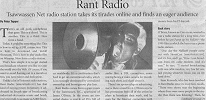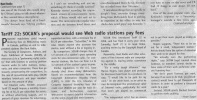Patrolling Season 1 & 2 double set now released on DVD!
BUY BOTH AND SAVE IN THE RANTSTORE! Over 11 hours of video and 5 hours of bonus features you don't want to miss out on.
RantInTheMedia
Details of appearances of RantMedia or its projects in the media.
Computer Paper - May 2003





Interview Conducted: January 6, 2003
Article Published: Friday April 11, 2003 - May 2003 Issue , Computer Paper
Interviewer: Peter Tupper
Audio Of Interview: Show #53 of the Sean Kennedy Show @ 128min49sec
Reprinted for safekeeping from Canada Computes:
Rant Radio: Tsawwassen Net radio station takes its tirades online and finds an eager audience
By Peter Tupper, posted 4/11/2003 2:28:54 PM
There's an old punk catchphrase that goes: This is a chord. This is another. This is a third. Now form a band.
Today, it could be something like: This is how to set up a DSL connection. This is how to download and install Shoutcast. This is how to play audio files on Winamp. Now form a radio station.
That's how simple it is to get started and broadcast whatever you like out into the world over the Web. Of course, if you want to avoid flaming out in a month or two, you need talent and dedication.
Unlike a lot of Internet radio stations, Rant Radio (www.rantradio.com) has that kind of staying power. In January, it celebrated its fourth year of broadcasting industrial electronica music and brash, irreverent talk to as many as 5,000 listeners worldwide. It's a combination that's hard to get on conventional radio, which is increasingly dominated by centralized ownership and homogenous play lists.
Rant Radio comes from a spare room in the Tsawwassen, B.C., apartment of James O'Brien. In the room are two swivel chairs, a couple of PCs full of audio files, a DSL connection, some microphones, a video camera for recording each show, and that's about it.
There's no sponsorship or advertising, nor is there a need for it. O'Brien says he has permission from all of the artists he plays to broadcast their work, and he pays for the Internet connection with money from his IT day job.
Back story
O'Brien, known as Cim on air, wanted to run a radio station for a long time, even before he saw Pump up the Volume--the 1990 film in which the hero runs a pirate radio station.
"One day the Nullsoft people come out with ShoutCast [www.shoutcast.com], and it's free, and I go, 'Wow. I can broadcast from my cable modem. And it's easy,'" he says. "I started broadcasting with one cable modem, very low bit rate, just playing whatever music was on my hard drive."
Sean Kennedy, who has been involved in Rant Radio since its inception, recalls, "There were shows near the beginning where there were more people in the studio than there was listening." Then, he was one of the friends who would drop by O'Brien's place to talk about whatever they wanted into a microphone.
"I've always been kind of a loud-mouth," Kennedy says. "My big problem is I can't see something and not say something if I think it's totally screwed." Kennedy started recording his improvised, stream-of-consciousness rants, which O'Brien would edit and set to music. The rants went into regular rotation and the listeners loved them, and even downloaded them. So far, Kennedy has recorded more than 300 rants.
"I rant about things that are specific to people's lives, everyday things, everything from McDonald's food to parking to nepotism at the office to why hot chicks date weird guys," says Kennedy. "I just have to turn on the news and I'll find 30 things to rant about. It's not hard."
One of the most popular rants was Kennedy's response to a Vancouver teenager's suicide a few years ago. "Purely for entertainment purposes," Kennedy says, "I just did this rant that said, 'Don't kill yourself, kill other people!'" A student at the University of Northern B.C. played it over the public loudspeakers in the gardens, until the security guards came and asked him to stop it.
"There's underlying tones of truth to [my] stuff, but it's mostly comedy," Kennedy says.
O'Brien adds, "It's to make people think, really. It's to present them with a point of view and open their minds."
While still playing music on Rant Radio, Kennedy and O'Brien tried their hands at radio plays, dramatic readings of Kennedy's science fiction and horror novels and TV shows distributed over the Web (see www.sktfm.tv). "We like to do stuff, do it well, and then move on," O'Brien explains.
Rant also began carrying programming produced by other people, like Hacker Mind, Radio Freak America, and Off Axis. "These shows just run themselves. They send me a demo, I go, 'Yeah, that's good. You're on,' and they just keep broadcasting," says O'Brien.
The Sean Kennedy Show
The mainstay of Rant's talk programming is the Sean Kennedy Show, a two-hour stretch of Kennedy's rants, weird news from around the world, and more electronica.
Kennedy sits in a swivel chair next to O'Brien, microphone in hand. The show begins at 8:00 p.m. PT, every Monday, with a shout out to the 50 or so fans on a designated IRC channel as well as those listening in over the Web. The program is a non-stop dialogue between Kennedy and his listeners, full of in-jokes and obscure references.
Kennedy gets particularly juiced when reading a news item about a turtle that broke out of its cage and went on a slow-motion rampage through a pet store, inflicting $16,000 in damage. He asks listeners to send him a turtle image by the end of the show. Sure enough, less than 10 minutes later, a listener sends in a picture of a dead and stuffed turtle.
At 10 p.m., the broadcast ends. Kennedy goes into the living room to slump in an armchair and eat chocolate. Meanwhile, O'Brien has another WinAmp playlist streaming out to the fans.
Rant Radio continues.
Radio community
The radio industry's conventional wisdom says that the two strengths of the medium are, it's free and it's local. Like conventional radio, Rant Radio is effectively free, but instead of serving a city or region, it serves a community of interest, which is industrial electronica listeners around the world.
"We just talk into a microphone. They [the fans] fill in the gaps," says O'Brien. Rant's listeners send in news items, original artwork, audio edits, 3D renderings and more, not to mention chatting on IRC and forums. Kennedy claims fans have made pilgrimages from all over North America to talk to him.
While listener service is at the heart of the Rant Radio ethos, it's also valuable to the artists. Even in a mid-sized radio market like Vancouver, electronica, and other kinds of alternative music are only played a few hours a week. Stations like Rant Radio are a vital means of exposure for artists and genres that don't fit into mainstream radio, which can translate into album and ticket sales.
The future
The future would seem to be bright for Internet radio. As high-speed Internet becomes more common, more people can Netcast for next to nothing. A PDA-equipped with a wireless card and a nearby access point can function like a Walkman with thousands of channels.
However, if proposed legislation--Tariff 22--passes, Internet radio in Canada could be crippled. The tariff has been introduced every year since 1996 without success, but similar legislation has been passed in the U.S. If it does pass, O'Brien and other hobbyist broadcasters would have to pay licensing fees, even if they don't make a cent from their venture and have permission from the copyright holders to air the music. This is why Rant Radio is campaigning to keep Internet radio unregulated.
"We do this out of the goodness of our hearts, out of our time, out of our pocket," explains O'Brien.
"We can't stop," adds Kennedy.
By Peter Tupper
SIDEBAR:Tariff 22: SOCAN's proposal would see Web radio stations pay fees
Proposed regulations could impose licensing fees on Webcasting music in Canada, putting an end to independent stations like Rant Radio.
The Society of Composers, Authors, and Music Publishers of Canada (SOCAN, at www.socan.ca) is a "performing rights society" that sells licenses to publicly perform musical works to radio stations, restaurants, and other companies. These fees go towards compensating the songwriters. In the case of conventional radio play, SOCAN monitors broadcasts and pays members based on the amount of play.
For Internet radio, SOCAN's proposed Tariff 22 would impose a monthly licensing fee of $0.25 per subscriber for services without advertising support, and 10 percent of gross revenues for advertising-supported services, with a minimum fee of $0.25 per subscriber. "Subscriber," in this case, means anyone who accesses the service, even without a fee or logging in.
By comparison, SOCAN charges fees of 1.9 percent of a station's gross operating costs for non-commercial radio. For commercial stations, the fees run from 1.4 to 3.2 percent of the station's gross income.
Similar regulations in the U.S. have already shut down many Webcasters. Based on recommendations from the Copyright Arbitration Royalty Panel (CARP), in 2002 the U.S. Librarian of Congress imposed licensing fees that could cost US$100 per year for each listener, and furthermore, required Webcasters to report detailed information on the songs played and their listeners.
SOCAN first introduced Tariff 22 in 1996, and has filed it every year since. Currently, Tariff 22 is in legal limbo, awaiting review by the Copyright Board of Canada.
Meanwhile, Rant Radio and other advocates of free Internet radio are campaigning against it, leaving artists somewhere in the middle.
"It's a really tough dilemma," says Marcus Rogers, bass player and producer for Vancouver band Coal. As a producer, he says, "I would like to be paid for my work." On the other hand, as an artist he says he recognizes the promotional value of Internet radio, particularly for work that won't get played on commercial radio.
"The independent artist has no reason not to get their music played as widely as possible."
Rogers suggests, "There has to be an out for a small, independent station." Artists should have the option of releasing their work to be played for free.
"We actually own the performing rights," says SOCAN legal counsel Anne Godbout, so members cannot decide to have some of their work performed without licensing fees.
"We don't grant licenses per work, because if we were to do that, you [broadcasters] would have to get thousands of licenses in order to perform a thousand works in a year."
Instead, SOCAN grants blanket licenses to perform works publicly.
--Peter Tupper
